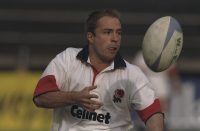 It might surprise you to learn – although possibly not – that the pre-eminent referee in world rugby in 2013 has never sat down and read the Laws of Rugby. Nigel Owens has been on top of his game like never before this year and played a wondrous hand in both New Zealand‘s games against South Africa in Johannesburg and Ireland in Dublin but has always remained true to his philosophy of never allowing commonsense and a feel for the game to be consumed by the laws and regulations.
It might surprise you to learn – although possibly not – that the pre-eminent referee in world rugby in 2013 has never sat down and read the Laws of Rugby. Nigel Owens has been on top of his game like never before this year and played a wondrous hand in both New Zealand‘s games against South Africa in Johannesburg and Ireland in Dublin but has always remained true to his philosophy of never allowing commonsense and a feel for the game to be consumed by the laws and regulations.
“Seeing that you ask, no I have never read the law book in my life, it’s disastrous for a referee to know that law book too well,” says Owens. “I’m pretty sure we were all given a copy when I first started out with the WRU but for me it’s much more about practice than theory. Let me explain:
“I started reffing so young as a teenager that it was virtually a case of on-site training and the basics quickly become ingrained believe me. It becomes part of your DNA.
“I had a love and a passion for rugby and I suppose a pretty decent core understanding of the basic laws but after that it became a process of learning the hard way every time I took charge of a game. Everybody has to serve their apprenticeship.
“As I progressed up the ladder, of course, you study the new regulations brought in by the IRB and just occasionally something odd will happen in a game and you will discuss it at a refs’ conference or with the assessor and refer back to the letter of the law.
“My reffing evolved naturally along with the game’s development I suppose. Listen, it’s like driving a car. My guess is that a lot of people would assess themselves as pretty good, safe, legal drivers but hand on heart how many of you have ever read the Highway Code? I mean really read it rather than just cherry picked when you have to pass your driving test.
“And even if you have read the Highway Code all the way through at some stage of your life how much of that can you actually recall and recite now? It becomes second nature doesn’t it? You hop in the car and drive automatically and that’s the story with my reffing. The car analogy is very good. You can drive in another country with different local regulations and by-laws but the essential laws of the road don’t change and you quickly pick up the local differences. I have never read Rugby’s Laws from cover to cover and probably never will.”
Owens’ approach does much to explain his success in the most difficult of jobs. Essentially what you get when he is in charge is ‘Nigel Owens rugby man’ trying to be as fair as humanly possible. Opposing teams place their trust and respect in him and not the letter of the law. The alternative, frankly, is a walking-talking, constitutional lawyer robotically applying one of the most fiendishly complicated set of laws and regulations in the sporting cannon to a hardened bunch of professionals who know every dodge and turn and try to anticipate his every move. Alas, that is still what we sometimes get.
Rather than a legal stalemate, the result with 42-year-old Owens is normally a game of rugby in which all the players are allowed to express themselves and display their rugby talent to best advantage, a game in which their skills take centre stage, which is surely what all those concerned hope and pray for, not least the paying spectator.
There are other strands to Owens’ genius, of course, not least his ability to crack a joke on the hoof as befits a man who was a semi-professional stand-up comedian in his early adult years. As with those beery nights on the stage at various west Walian watering holes, timing is everything. And on a rugby pitch getting the balance right is vital, light comedy is absolutely fine but can never be allowed to degenerate into pantomime or farce.

This is a man with a well-honed sense of the ridiculous, possibly a referee’s greatest attribute. He once accidentally drank a refereeing colleague’s contact lenses when necking a glass of water – the “have you got eyes in the back of head ref” jokes kept coming for years after – while on another occasion, in his salad youth, Owens failed to note the name of the player he yellow carded and was forced to obtain the information for his official report by phoning up the club secretary that night claiming to be a member of the Press. A certain native cunning does come with the job description.
A man without side, Owens has no qualms these days about making jokes about his own sexuality, although his private life once troubled him so much that he attempted suicide on the top of Bancyddraenen near his parents’ house in 1996.
He eventually “came out” in May 2007 and has scarcely looked back since. Last month, when taking charge of the epic Ireland-New Zealand encounter, he logged his 50th cap. He will start the 2014 Six Nations with England‘s opening game against France in Paris and at this stage would seem certain to play an important role at the 2015 World Cup
“The key to everything is enjoyment,” says Owens with the air of somebody who has also known the dark side. “And with reffing you need to enjoy it more than any professional job I can think of because if you don’t you will be in a bad place mentally and eventually you will grind to a halt and not be able to do the job.
“You are going to make mistakes. No referee in history has ever had the perfect game and never will so you need to acknowledge that to yourself while always trying to be as good as is humanly possible, the emphasis on humanly.
“You will also get stick, whether you deserve it or not, simply because you are the man with the whistle making key decisions that might break the hearts of one set of supporters and you need to have squared that mentally. Get those things settled in your mind and then you can just enjoy being part of a great game and some great occasions.
“I can’t remember the last time I failed to enjoy a game. Sometimes I tweet about what a great game it was etc, but often I turn the phone off and stay away from twitter because I am aware that one group of supporters might be a bit down for an hour or two. You have to be aware of supporters’ feelings. The last thing they want when they’ve lost is referee telling the world what a great match it was.
“I am very lucky and blessed because I don’t get pre-match nerves, if you started thinking what lays ahead of you on big match day and all the potential for difficult decisions and controversy it might freak you out a bit. There is so much potentially that could go wrong. I used to get a little apprehensive before landmark games – first senior match, first Heineken Cup-tie, first Six Nations or World Cup game – but once I got those under my belt nerves have never been a factor.

“There were certainly no nerves before the South Africa-New Zealand Test at Johannesburg this summer or the Ireland match against the Kiwis a couple of weeks back. Just excitement at the prospect of what they might produce. I try to chill as much as possible and then get very switched on and focused in the immediate moments leading up to the start. It’s not helpful using up all your nervous energy before the game starts. I will often be having a laugh and bit of banter up to just ten minutes before we run out which is when I really switch on.
“You must have that ability to switch on and off. I will go down to my local club and sit there watching the match with friends but I am completely out of refereeing mode. If there is an incident or interesting call they will say, ‘what do you think Nigel’ and I won’t have a clue. My eyes might have been on the match but my attention was elsewhere – on the day, the weather, the match generally, the conversation I was having with friends and the prospect of a couple of points.
Owens works hard at his fitness and religiously self-reviews the game before, but he is a strong opponent of specifically preparing for the next game ahead.
“I’ve been around the block, I know roughly what will be heading my way but it’s not clever to anticipate because you can start looking for offences that don’t exist. Teams surprise you all the time. They can adopt a new approach and new tactics one week or be much more disciplined at the breakdown than perhaps the previous match.
“A post-match self-review of my performance, though, is vital and a key part of my week. I am very self-critical because I hate letting teams down with my mistakes. Actually that’s the only downside of the job because you can indirectly be affecting players’ careers and livelihoods.
“I am very harsh on myself. ‘Bloody hell why am I standing there, why did I do that, that was a bit harsh and so on’. But again you have to keep a sense of perspective. It’s impossible to get everything right. What is possible though is to be rock solid on the basics.
“Rugby doesn’t need to get too hung about laws and, indeed, referees generally. In the last few months I have been privileged to be involved in two of the greatest rugby games and sporting spectacles it is possible to imagine.
“When you look at those matches are you seriously telling me this great sport has a problem? You know, and I know, everybody in rugby knows, that the laws work fine when the intent is there from both teams to play positive, attacking, ‘legal’ rugby. It’s when that intent is missing, when teams go negative and set out to bend or break the laws that games can go sour. Referees have off days as well, we are only human, and that doesn’t help but let’s be honest and recognise what is actually going on. In professional sport there are sometimes those who don’t necessarily want the game played in the manner which the laws encourage and allow.
“The most important thing in reffing is always to do the right thing, that is your victory, your win if you like, and a large part of the satisfaction I get from the job. So I can honestly say I have never agonised over a decision. In Dublin the other day, at the Aviva, of course I was aware that New Zealand’s historic year record was on the line when Aaron Cruden lined up for that final conversion and, of course, I was aware that all Ireland would be horribly disappointed to see victory turn into a draw and then possibly a defeat right at the death. But really it made no difference.
“I had warned Ireland when he took the previous conversion that they had charged too soon and before that final match-deciding conversion attempt I warned them again. They knew the score – literally – and when they chanced their arms again and charged early it was an easy decision to order the re-kick when Cruden missed. In the long run it’s decisions like those that actually earn you respect and make your life a little easier out there in the middle. It doesn’t always feel like that at the time mind!”
3 Comments
Leave a Comment
You must be logged in to post a comment.























Pingback: stapelstein
Pingback: auto swiper
Pingback: bear bows